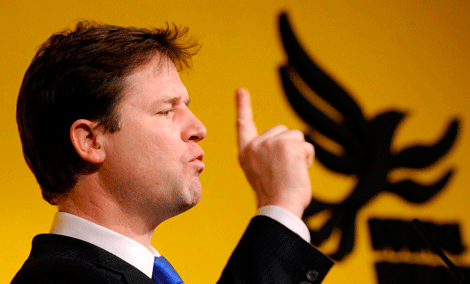
Britain’s first ever televised prime ministerial debate, which took place on April 15 in Manchester, can be seen on C-Span here (though when I watched it the sound and pictures were distractingly out of sync), or heard on BBC Radio 4 here.
There was another first, perhaps more consequentially important than the debate itself: for the first time, the broadcast media gave a Liberal Democrat leader equal time and prominence with his Labour and Conservative counterparts. Since the debates (two more will follow, on April 22 and 29) were announced in March, it’s been said that the outsider, Nick Clegg, would “win,” provided he could hold his ground against David Cameron and Gordon Brown. He not only held his ground, he exacted every possible advantage from the claim that his opponents represented the “old politics” while he stood for the new.
Well-briefed and fluent, talking directly to the cameras and the nation, he won the debate by a mile, according to three respected polls, which gave him, on average, 52 percent against Cameron’s 25 percent and Brown’s 18 percent. (Along with most of the commentators that I read, I thought Brown did much better than that; defending his incumbency, and 13 years of Labour rule, with impressive logic and vigor—but he undeniably has what Neil Kinnock described earlier this week as a “radio face,” whose natural expression in repose is jowly and forbidding.) If Clegg’s success in the debate translates into a several-point rise for the Liberal Democrats in the opinion polls, where they are presently stuck at around 20 percent, and in the real poll on May 6, a hung parliament will very probably result.
For decades, the Liberal party, then the SDP-Liberal Alliance, now the Lib Dems, have made proportional representation, based on the single transferable vote (STV) in multi-member constituencies, a major part of their platform. Under that system, once a candidate has enough votes to be declared the winner, the remaining votes would be apportioned to other candidates. Until now, such radical electoral reform has seemed a vain ambition. Election after election, the Liberal Democrats pick up a sizeable chunk of the national vote (22 percent in 2005) but win a disproportionately small number of seats (less that 10 percent in 2005, which was a good year for them).
When given a level media playing field, as they were on Thursday (and in the “Ask the Chancellors” debate on March 29, which Vince Cable, the Lib Dem shadow chancellor, won handsomely against George Osborne and Alistair Darling), the party has performed exceptionally well, thereby reinforcing their claim to be treated fairly at the ballot box. If, on May 6, they manage to retain the 63 seats they held in the last parliament and capture some Labour and Conservative marginals, they may well be in a position to wring from Gordon Brown a commitment to immediate electoral reform in exchange for their support of a minority Labour government—though such a deal with Cameron seems a lot less likely.
Britain already has proportional representation: the STV system is used in elections for the Northern Ireland Assembly, and “List PR” for the European Parliament elections. The country is out of step with the rest of Europe and the Republic of Ireland in clinging to the first past the post system for its domestic elections, and the electorate is showing every sign of having had its fill of one-or-the-other, Conservative or Labour government. One of the most striking and persistent features of recent opinion polls has been the number of people (ranging from around 30 percent to 43 percent) who’ve said that Britain’s interests would “best be served” by a hung parliament—in other words, they want to vote for a coalition. Or, as Paddy—now Lord—Ashdown, the former Lib Dem leader, said the other day, “The mood of the country, I think, is that Gordon Brown deserves to lose, but David Cameron doesn’t deserve to win.” This is the perfect climate for his party.
Britain hasn’t been ruled by a true coalition since the Churchill government of 1940-1945, though Harold Wilson in 1974, and James Callaghan, from 1977-1979, kept their minority Labour governments alive by doing deals with other parties (mainly the Liberals, as they were then) to save them from no-confidence motions in the House of Commons. Should the Lib Dems do well in May, and at last achieve the electoral reform they have so long promoted, it’ll be the end of the two-party system, and government by coalition is likely to be the norm in Britain for the foreseeable future, with no party able to secure an overall majority. My brother Colin, a lifelong Labour voter, now a Liberal Democrat supporter (Blair’s juvenile complaisance in the Bush/Cheney Iraq project was my bro’s final straw), said to me over the phone last week: “It seems to work alright in Germany, so why not here?”
Advertisement


